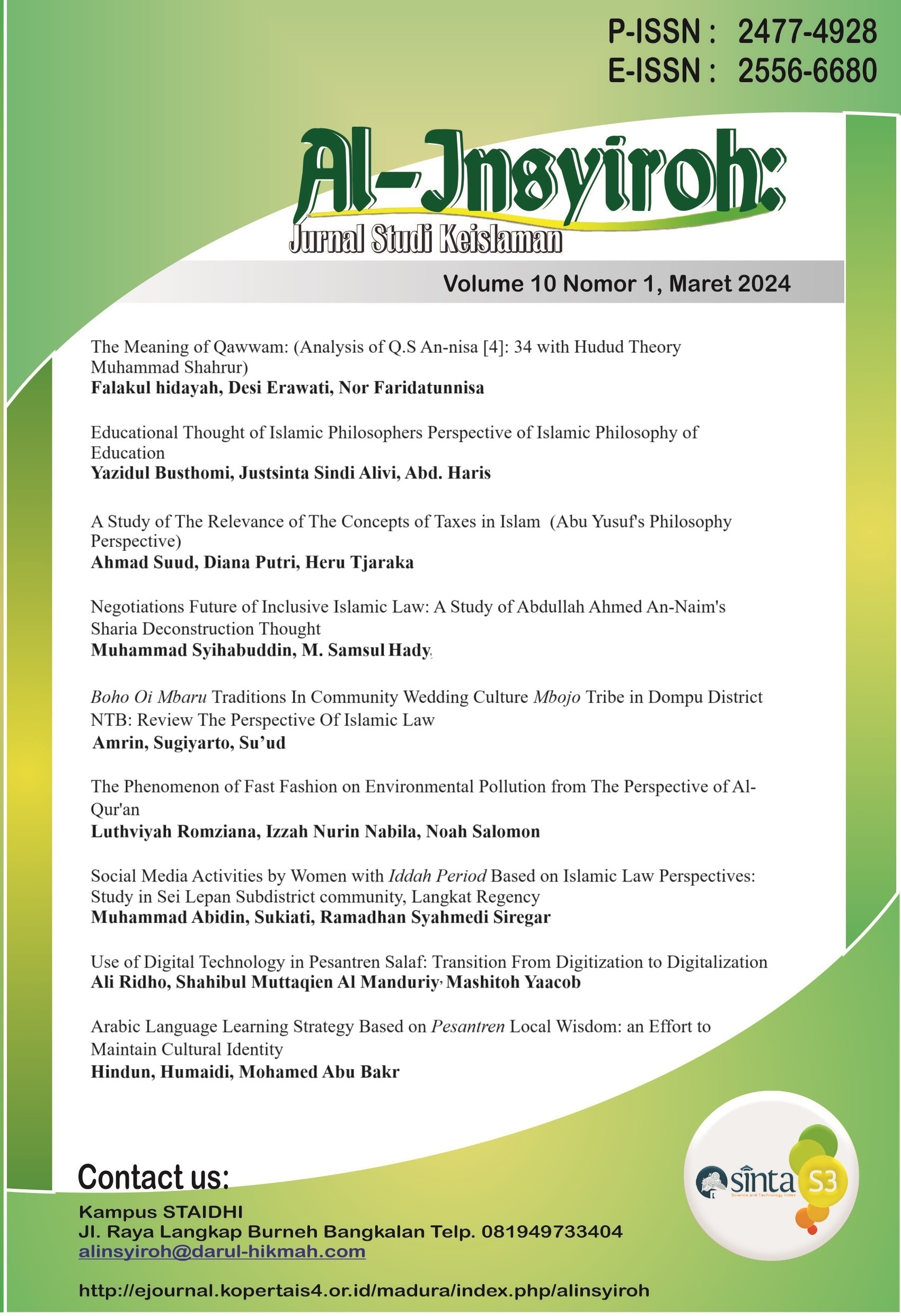Educational Thought of Islamic Philosophers Perspective of Islamic Philosophy of Education
DOI:
https://doi.org/10.35309/alinsyiroh.v10i1.7405Keywords:
Educational Thought, Islamic Philosophers,, Philosophy Of EducationAbstract
The true goal of education is to increase human competency, which is achieved through the application of different information and skills that humans themselves require. The goal of education is to support students' human potential development. Education is seen by Indonesians as the country's battle. History has demonstrated that ties and exchanges with the Islamic civilization, which is presently undergoing growth, are inextricably linked to the highs and lows of education. With the rise of Islamic education ideas, this is undeniable. History reveals that the Abbasid period, which reached its zenith, is when Islamic educational philosophy started to take shape. The idea of education, which includes children's education, educational objectives, and educational principles, was first articulated by Al-Qabisi.It is impossible to learn about other objects that have a higher ontological status, namely immaterial reality, without the presence of the five senses, according to Ikhwan As-Shafa. Only the five senses are capable of perceiving objects in the form of material-physical reality that are present in space and time. metaphysical. The As-Shafa Brotherhood's profound admiration of the senses demonstrates the significant influence of Aristotelianism in their epistemological thought. In this regard, they even venture to promise that, provided all circumstances are met, there will be no errors made by the senses.References
Abbas, Nurlaelah. “Muhammad Abduh : Konsep Rasionalisme Dalam Islam.†Jurnal Dakwah Tabligh 15, no. 1 (2014).
Abdullah, Amin. Antara Al-Ghazali Dan Kant: Filsafat Etika Islam. IRCISOD, 2002.
Afandi, Rahman. “Konsep Pendidikan Ikhwan Al-Shafa Dan Relevansinya Dengan Dunia Postmodern.†Insania : Jurnal Pemikiran Alternatif Kependidikan 24, no. 1 (2019). https://doi.org/10.24090/insania.v24i1.2802.
Arwen, Desri, and E Kurniyati. “Pemikiran Pendidikan Islam Muhammad Abduh.†Jurnal Kajian Islam Dan Pendidikan Tadarus Tarbawy 1, no. 1 (2019). https://doi.org/10.31000/jkip.v1i1.1492.
Asif Farooq Zai, and Mir Rahul Ahmad. “Ibn-Khaldun’s Theory of Education and Its Impact on the Development of Modern Education.†International Journal of Advanced Research in Science, Communication and Technology, 2021. https://doi.org/10.48175/ijarsct-2033.
Atin Risnawati, and Dian Eka Priyantoro. “Pentingnya Penanaman Nilai-Nilai Agama Pada Pendidikan Anak Usia Dini Dalam Perspektif Al-Quran | As-Sibyan: Jurnal Pendidikan Anak Usia Dini.†As-Sibyan 6, no. 1 (2021).
Farabi, Mohammad Al. “Ibn Khaldun’s Considerations Relating To Islamic Education And Their Perspective On The Future.†Ta Dib Jurnal Pendidikan Islam 11, no. 2 (2023). https://doi.org/10.29313/tjpi.v11i2.10531.
Harisah, Afifuddin. “Filsafat Pendidikan Islam, Prinsip Dan Dasar Pengembangan.†Filsafat Pendidikan Islam, 2018.
Hidayat, Tatang, Abas Asyafah, and 赵岩. “Filsafat Pend.†Al-Tadzkiyyah: Jurnal Pendidikan Islam 10, no. I (2019).
Khaeroni, Cahaya. “GAGASAN PEMBAHARUAN PENDIDIKAN ISLAM MUHAMMAD ABDUH (1849-1905).†At-Tajdid : Jurnal Pendidikan Dan Pemikiran Islam 1, no. 01 (2017). https://doi.org/10.24127/att.v1i01.340.
Komaruddin. “Pendidikan Prespektif Ibnu Khladun.†Pandawa: Jurnal Pendidikan Dan Dakwah 4, no. 1 (2022).
Marimba, Ahmad D. “Pengantar Filsafat Pendidikan Islam,†2021.
Mehr Mohammadi, Mahmoud, and Ali Hosseini Khah. “A Comparative Analysis of Ghazali and ÙEgan’s Views on Imagination and Education: The Mythic Understanding and Children Learning.†J. Humanities 18, no. 2 (2011).
Moleong, Lexy J. “Metode Penelitian Kualitatif, Cetakan Ke-36, Bandung: PT.†Remaja Rosdakarya Offset 6 (2017).
Muhyidin, Muhyidin. “Aliran Pendidikan Islam Tradisionalis-Tekstualis (Studi Pemikiran Al-Qabisi).†INSANIA : Jurnal Pemikiran Alternatif Kependidikan 18, no. 1 (2013). https://doi.org/10.24090/insania.v18i1.1444.
Pratiwi, Wulan Octi, Muhammad Nurwahidin, and Sudjarwo. “Menelaah Tujuan Pendidikan Indonesia Dari Perspektif Filsafat Barat Dan Islam: Study Komparatfi Pemikiran Plato Dan Al-Ghazali.†Jurnal Pendidikan Dasar Dan Sosial Humaniora 2, no. 1 (2022).
Ramdhan, Tri Wahyudi, Mufaizin Mufaizin, and Moh Kholil Baita Putra. “Kurikulum Merdeka’s Authentic Assessment for Multicultural Islamic Religious Education.†Jurnal Al-Murabbi 8, no. 2 (2023): 60–76.
Saifullah. “Ibnu Sahnun Dan Al-Qabisi.†Edukasi 12, no. 3 (2014).
Saifullah, Saifullah. “Konsep Pedagogik Dalam Pemikiran Ibnu Sahnun Dan Al-Qabisi.†Edukasi: Jurnal Penelitian Pendidikan Agama Dan Keagamaan 12, no. 3 (2014). https://doi.org/10.32729/edukasi.v12i3.97.
Saihu, Saihu. “Konsep Pembaharuan Pendidikan Islam Menurut Fazlurrahman.†Andragogi: Jurnal Pendidikan Islam Dan Manajemen Pendidikan Islam 2, no. 1 (2020). https://doi.org/10.36671/andragogi.v2i1.76.
Shabir, Muslich, and Sulistiyono Susilo. “Muhammad Abduh’s Thought on Muhammadiyah Educational Modernism: Tracing the Influence in Its Early Development.†Qudus International Journal of Islamic Studies 6, no. 2 (2018). https://doi.org/10.21043/qijis.v6i2.3813.
Siyoto, Sandu. M. Ali Sodik. 2015. Dasar Metodologi Penelitian. Yogyakarta: Media Publishing, 2015.
Sugiyono, Dr. “Metode Penelitian Kuantitatif Dan R&D.†Bandung: Alfabeta, 2010, 26–33.
Sugiyono, Memahami. “Penelitian Kualitatif Dan R & D.†Bandung: Alfabeta, 2009.
Suriadi, Suriadi. “Rekonstruksi Muhammad Abduh Dalam Pembaharuan Pendidikan Islam.†AL-WIJDÃN Journal of Islamic Education Studies 2, no. 2 (2017). https://doi.org/10.58788/alwijdn.v2i2.77.
Suryadarma, Yoke, and Ahmad Hifdzil Haq. “Pendidikan Akhlak Menurut Imam Al-Ghazali.†At-Ta’dib 10, no. 2 (2015).
“The Educational Philosophical Thoughts of Abu Hamid Al Ghazali (1058 - 1111) and ‎John Dewey (1859 - 1952): A Comparative Study‎.†Jordan Journal of Educational Sciences 19, no. 2 (2023). https://doi.org/10.47015/19.2.14.
Uni, Siti Qurrotul A’yuni. “Analisis Pemikiran Pendidikan Menurut Ibnu Sina Dan Kontribusinya Bagi Pendidikan Islam Di Era Modern.†Journal of Islamic Education Research 1, no. 3 (2020). https://doi.org/10.35719/jier.v1i3.39.
Wahyuni, Sri, Fitriani Siregar, Sudi Fahmi, and Febri Giantara. “Keselarasan Pemikiran Fazlur Rahman Terhadap Proses Pendidikan Agama Islam Di Indonesia Masa Kini.†Baitul Hikmah: Jurnal Ilmiah Keislaman 1, no. 1 (2023). https://doi.org/10.46781/baitul_hikmah.v1i1.697.
Yenuri, A A. “Manaqib Pemikiran Para Filsuf Islam Tentang Pendidikan.†Undang-Undang Republik Indonesia Nomor 19 Tahun …, 2018.
Downloads
Published
How to Cite
Issue
Section
License
Copyright (c) 2024 Al-Insyiroh: Jurnal Studi Keislaman

This work is licensed under a Creative Commons Attribution-ShareAlike 4.0 International License.

This work is licensed under a Creative Commons Attribution-ShareAlike 4.0 International License.












